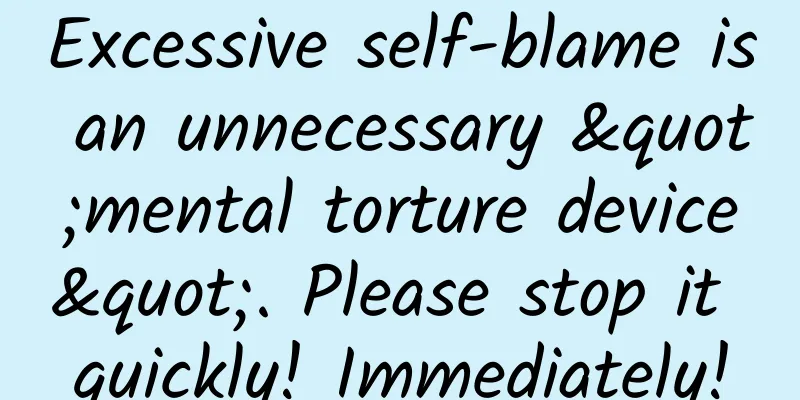Excessive self-blame is an unnecessary "mental torture device". Please stop it quickly! Immediately!

|
Do you say "sorry" for things that are not your fault at all? Once things turn out to be unsatisfactory for yourself or others, do you fall into deep self-blame and find it difficult to extricate yourself? Do you often feel sorry for things that are beyond your control and beyond your control? When the atmosphere suddenly becomes dull and everyone is silent, do you get restless and worry that it is because of your poor choice of topic? Recently, "Excessive self-blame is an unnecessary mental torture" has become a hot topic on a certain platform and has attracted widespread attention. If you often experience the above situations, you must read this article, because you may often blame yourself too much! Image source: Internet screenshot Long-term excessive self-blame can have devastating consequences. So how can we get rid of excessive self-blame? Let’s talk about it today! Copyright images in the gallery. Reprinting and using them may lead to copyright disputes. "Reasonable self-blame" is responsibility Excessive self-blame is abuse We all make mistakes in life. You may have made unfortunate errors in judgment or caused harm to yourself or others. Feeling guilty about your mistakes, harm, or missed opportunities is a form of responsibility and growth. Moderate and reasonable remorse is a driving force for change. It allows us to review our actions and identify what we did well and what we didn’t do well. It gives us insight, prompts us to make up for our mistakes, and provides us with a direction to move forward. However, when self-blame is excessive and becomes a "conditioned reflex" when things go wrong, you will be immersed in the regret and self-denial of "it's all my fault" and "if I could have done it then", and even think that you are "bad" or "defective", this excessive self-condemnation will become a heavy yoke imposed on yourself, with devastating consequences. It not only hinders your personal growth and progress, but also makes you suffer emotionally and difficult to feel the joy and satisfaction of life. So what is the difference between self-blame and excessive self-blame? Self-blame is a reflection on one's own behavior and a search for reasons why one's expectations were not met. However, it is one thing to examine our role and behavior in a certain situation, and it is another to take it personally, even magnify it, and indulge in self-blame. Therefore, there are actually two red lines between "reasonable self-blame" and "excessive self-blame". If you cross any one of them, "self-blame" will become a mental torture device and a torture imposed on you. 1. Red Line 1: From Behavior Self-blame to Character Self-blame If you find that your self-reflection frequently includes denial of your own character and criticism of your personal traits, such as statements like “Why am I so stupid?”, “I’m really bad?”, “I’m an unqualified parent”, etc., then this may be a dangerous signal, indicating that you have crossed the red line and fallen into a vortex of excessive self-blame. "Character self-blame" is actually a form of self-PUA, the most toxic form of emotional abuse. It is like a distorted mirror that magnifies our perceived shortcomings, whether real or imagined, and leads us to fall into misunderstandings in our assessment of our self-worth, leading to serious damage to our self-confidence and self-esteem. 2. Red Line 2: From taking responsibility to shouldering the responsibility of others People who are "overly self-blaming" tend to point all the blame at themselves, being tolerant of others and critical of themselves. This psychological state makes them easy to become "scapegoats" for others, and they are inadvertently pushed into a situation where they bear all the responsibilities. If the other person is in a bad mood, you will feel guilty and reflect on whether you have done something wrong, even if this emotional change has nothing to do with yourself; if the other person is not satisfied with what you have done, you will feel guilty and try to change your behavior, even if it goes against your wishes and principles; if the other person shows disappointment, you will feel guilty and think that it must be your own shortcomings that caused the other person's disappointment, even if in fact it has nothing to do with you... These behaviors all show that "excessive self-blame" has become a habit, which deeply clamps your thinking and traps you. Why do we blame ourselves too much? Self-blame often stems from a simple and direct question: Why? It is human nature to "find reasons". However, the occurrence, direction and outcome of things are intertwined by many complex factors. People who are prone to "over-blaming themselves" often ignore these factors when looking for reasons and take all the responsibility on themselves. This tendency is not achieved overnight, but accumulated over many years. 1. Source 1: Internalization of childhood accusations Self-serving bias shows that we actually tend to be more tolerant of ourselves than others. If we don’t do well in school, it’s not because we are not smart, but because we haven’t worked hard; if others do well in school, it’s not because they have a high IQ, but because they study day and night. Why do people who are overly self-blaming take responsibility for things that are not theirs? In fact, most people who are overly self-blaming often receive too little affirmation and too much blame when they were young. Copyright images in the gallery. Reprinting and using them may lead to copyright disputes. Self-directed anger and self-blame, although they may seem illogical and irrational from an adult’s perspective, are a vital coping mechanism for children who are completely dependent on their caregivers. They provide a way to rationalize the seemingly inexplicable injustices they face. For example, some parents will bring their emotions from work to their children, blaming their children for their own unhappiness. For a helpless, vulnerable child, it is a cruel and disturbing fact to realize that those who are supposed to nurture and protect them are actually the source of their pain. Rather than believing that the world they live in is fearful, uneasy, out of control, and hostile, perhaps thinking that they are not good enough or that they are the root of the problem gives them a sense of control and creates the illusion that they can be "fixed" as long as they work hard enough. When faced with authority, we couldn’t blame others as children, so we could only blame ourselves. Gradually, we internalized the accusations of others as attacks on ourselves. Even when we grow up and become stronger, we still use this way of thinking as a defense against loss of control and harm. 2. Source 2: Irresponsible transfer by others For many people, it is a natural reaction to try to understand what happened and fill in the gaps left by the surprising behavior of others. However, as the directly affected party, we sometimes inevitably fall into the thinking trap of "victim blaming" and fall into the cognitive misunderstanding of "it must be my fault, so they treat me like this". This cognitive misunderstanding may occur in many situations. For example, your child may be friendly and affectionate with his peers, but distant and resistant to you; your partner may be patient and caring with friends, but unreasonable to you; your colleague may smile at everyone, but be difficult and picky with you. Sometimes it is difficult to understand where this hostility comes from, and you can only look for the reason in yourself. In fact, you know very well that it is not about you, but you still can't get rid of the mentality of "maybe it's my fault". Self-blame is often related to others. When facing different people, we have different frequencies and degrees of self-blame. If you find that you often "over-blame yourself" when facing someone, you may need to think about whether the other person is pushing the responsibility that he or she should bear onto you, making you the scapegoat of the relationship. For example, you are very caring to your partner, but your partner is very picky about you and blames you for all the problems in his or her life, saying that you are not doing enough, that you are not close to him or her, and that you spend too little time with him or her... But you should know that a relationship requires the joint efforts of both parties. Copyright images in the gallery. Reprinting and using them may lead to copyright disputes. How to avoid falling into "excessive self-blame"? Self-blame is an emotional experience and a way of thinking. Thinking affects feelings, and feelings in turn shape thinking. For example, success makes you proud, failure makes you depressed... In most cases, it is not easy to directly control these feelings. In contrast, it is relatively easy to change our thoughts, generate new ideas, and put forward different opinions. When we face the same thing, we only need to slightly adjust the perspective of observation, the direction of thinking, or make reasonable guesses, and our feelings may change significantly. For those who are prone to falling into the trap of excessive self-blame, it is important to remind ourselves that this is not all about you, it is not all about me, it is not all about us. We need to recognize that everyone has a unique role and responsibility, and that the development of things is often influenced by a combination of many factors. 1. Antidote 1: Self-reminder If we can consciously adjust our way of thinking and transform the excessive self-blame of "this is all my fault" into "there are many people who need to be responsible for this, and I am just one of them", then the burden on our shoulders may be much lighter. When we fall into the pain of excessive self-blame, there are two questions that are very helpful for us to jump out of the trap of self-attack thinking. 1. How much influence do I have on a situation? This question helps us objectively assess our role and contribution to an event or situation. We tend to overestimate our own influence and underestimate the role of other factors, which can lead to unnecessary self-blame. 2. Am I the only person with influence? This question reminds us that the development of things is usually not determined by one person alone. There are often multiple factors and multiple people working together to contribute to an event, and everyone plays a certain role in it. Recognizing this, we can avoid blaming ourselves for everything and reduce the psychological burden. Through such self-inquiry and reflection, we can look at problems more rationally and avoid the negative effects of excessive self-blame. 2. Antidote 2: Reminders from others If you find yourself struggling to remind yourself, it might be a good idea to talk to someone close to you. Outsiders can often look at things more objectively, and their perspectives may provide us with a fresh perspective. Research has found that supportive friends and family who strongly disagree with your negative self-talk can help change the way you talk to yourself. This is not about seeking empathy or comfort, but about hoping that they can point out to us: "This is not all about you. You don't know what the other person is going through. It may not be because you are bad, and it may not be because you did anything wrong." This gives us a reminder, an anchor point, to pull us out of the addiction to "excessive self-blame." Summarize We must learn to get rid of the shackles of "over-blaming ourselves" instead of shirking our obligation to "take responsibility". We must be brave enough to take responsibility for our mistakes, but taking responsibility is not the same as self-attack; making mistakes is a normal part of life, but making mistakes does not mean that you are a mistake. We are not perfect, and we can't always do it right, but there is no reason to shoulder all the responsibility alone if you can share it with others. Admit your mistakes with confidence, and take responsibility with dignity. References [1]Why Do I Feel Like It's My Fault? | Psychology Today [2]A systematic review of psychosocial factors associated with emotional adjustment in in vitro fertilization patients Helen E Rockliff 1, Stafford L Lightman 2, Emily Rhidian 2, Heather Buchanan 3, Uma Gordon 4, Kavita Vedhara 3 Hum Reprod Update . 2014 Jul-Aug;20(4):594-613. [3] Ilse Sander. Guilt Clearing Exercise: For Those of You Who Often Blame Yourself. Beijing: Taiwan Straits Publishing House. 2022. [4]Breitenbecher, KHR (2006). The relationship among self-blame, psychological distress, and sexual victimization. Journal of Interpersonal Violence, 21, 597-611. https://doi.org/10.1177/0886260506286842. [5]https://www.psychologytoday.com/intl/blog/tech-support/201801/tackling-self-blame-and-self-criticism-5-strategies-try [6]https://www.psychologytoday.com/intl/blog/living-with-emotional-intensity/202404/self-blame-and-internalized-anger Author: Su Jing, National Level 2 Psychological Counselor Reviewer: Yang Xiaoyang, Associate Professor, School of Psychology, Sichuan Normal University |
<<: Five things to note when checking for diabetes
>>: In the hot summer, be alert to acute attacks of glaucoma!
Recommend
What to do if you have flat breasts?
Women with normal breasts cannot experience the p...
Is it neurasthenia or depression? One look and you'll know
Depression and neurasthenia are both common disea...
Beware in spring! Conjunctivitis is on the rise recently!
As the spring breeze blows and everything comes b...
Can sodium bicarbonate cure gynecological diseases?
Due to the particularity of the female body struc...
Enjoy the holidays, but don’t forget to give your eyes a break!
Enjoy delicious food during the Spring Festival T...
Why is there bleeding again two days after the menstrual period?
Generally, normal adult women have menstruation o...
ben-evans: WhatsApp's daily message volume exceeds global SMS volume
Recently, WhatsApp released data showing that its...
What are the methods to treat vulvar leukoplakia?
Leukoplakia of the genitals is a disease that tro...
Does laughing after transplantation affect implantation?
If you want the embryo to implant successfully af...
What soup should women drink to replenish blood?
Normally, many women have some symptoms of anemia...
Is it OK for women to wear bras when exercising?
Exercise is an activity that we must do in our da...
What should I do if I want to have sex after I get pregnant?
As people learn more about sex, many young people...
There is actually a lot of knowledge about sneezing! Whether you hold it in or sneeze, you have to be careful!
Ah... sneeze! According to popular belief, the nu...
How many of these 6 drugs with different specifications and indications do you know?
It is very common for the same drug to have diffe...
Can women eat ginger soaked in vinegar?
Pickling ginger in vinegar is a very good way to ...









